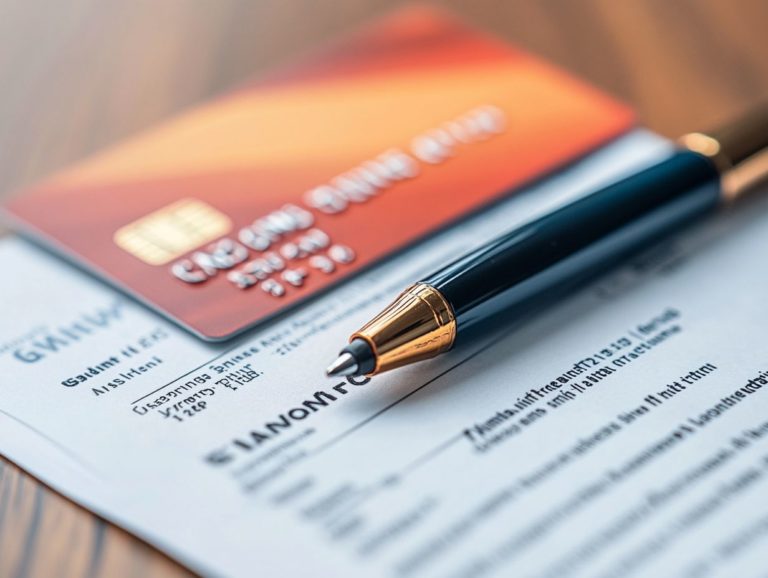What Are the Credit Card Consumer Protections?
Navigating the world of credit cards can feel overwhelming. However, understanding credit card consumer protections is vital for safeguarding your finances.
These protections serve as essential shields against fraud, billing errors, and disputes, ensuring that your rights as a consumer are upheld.
This article explores the various types of protections available, clarifying their significance and guiding you on how to take advantage of them.
It also highlights limitations you should be aware of and offers resources for further exploration. Stay informed and empowered as you take charge of your credit management.
Contents
- Key Takeaways:
- Understanding Credit Card Consumer Protections
- Types of Credit Card Consumer Protections
- How to Use Credit Card Protections for Consumers
- Limitations and Exclusions
- Additional Resources
- Frequently Asked Questions
- What are the Credit Card Consumer Protections?
- What are some examples of Credit Card Consumer Protections?
- How do Credit Card Consumer Protections benefit consumers?
- Are there any protections for lost or stolen credit cards?
- How do I file a dispute?
- What should I do if I believe I have been a victim of credit card fraud?
- Can I be held responsible for fraudulent charges on my credit card?
Key Takeaways:

- Credit card consumer protections are important safeguards that help protect consumers from fraud, billing errors, and other issues related to their credit card use.
- These protections include fraud protection, dispute resolution, and assistance with billing errors.
- It s essential for consumers to understand how to use these protections, including tips for safeguarding themselves and steps to take when facing an issue with their credit card.
Understanding Credit Card Consumer Protections
Understanding credit card consumer protections is crucial for navigating the financial landscape, especially in the United States. Laws like the Credit CARD Act, Truth in Lending Act, Fair Credit Billing Act, and Fair Debt Collection Practices Act offer essential safeguards for you as a consumer.
These protections empower you to make informed financial decisions, uphold your rights, and hold credit card issuers accountable for unfair practices. As credit cards become integral to daily transactions, being well-versed in these protections is vital for managing your credit responsibly.
What Are Credit Card Consumer Protections?
Credit card consumer protections are vital legal safeguards that empower you as a cardholder with rights and recourse against unjust practices by credit card issuers.
These protections play a crucial role in maintaining a fair balance in your relationship with financial institutions. Recognize that you have the right to dispute unauthorized charges or billing errors and may qualify for refunds under certain conditions.
Rights that limit your liability in cases of theft or fraud provide extra security. By understanding these provisions, you can navigate your financial dealings with confidence, ensuring that discrepancies or unfair treatment are promptly addressed.
Why Are They Important?
Credit card consumer protections are essential for building trust and safety in today s intricate financial landscape, especially during times of economic uncertainty.
These safeguards empower you to understand and assert your rights, allowing you to engage with financial products more confidently. When you’re well-informed about the protections available to you, you’re more likely to make responsible financial decisions that enhance your overall financial health.
This awareness helps you navigate potential pitfalls and contributes to a more stable credit economy, as empowered consumers like you foster accountability among financial institutions.
Ultimately, these consumer protections form the backbone of financial stability, promoting ethical practices and responsible lending throughout the marketplace.
Types of Credit Card Consumer Protections
You ll find a range of credit card consumer protections tailored to safeguard you from the myriad risks tied to credit card usage. These protections encompass everything from billing errors to fraud, as well as the processes for resolving disputes.
Take control of your credit today!
Fraud Protection

Fraud protection on credit cards serves as a safeguard for you, shielding you from unauthorized charges and ensuring you aren t financially liable for transactions you didn t approve.
This system helps you feel secure, allowing you to make purchases without the constant worry over your financial security.
Credit card issuers leverage modern technology and fraud detection algorithms that monitor your transactions in real-time, promptly flagging any suspicious activity for further investigation.
If you ever find fraudulent charges, you have the right to report them, often leading to the reversal of those unauthorized amounts. The Fair Credit Billing Act (a law that protects your rights when dealing with billing errors) offers you legal protection, capping your liability to a minimal amount and strengthening your defense against fraud.
By understanding these mechanisms, you can easily understand your rights and take action in the unfortunate event of fraud.
Dispute Resolution
Dispute resolution offers you a structured way to tackle issues with your credit card transactions, enabling you to resolve disagreements with credit card issuers efficiently.
The process typically kicks off with you reviewing your statement for any discrepancies. Next, gather all the relevant documentation to back up your claim.
Under the Fair Credit Billing Act (FCBA), you have the right to dispute charges, and it s essential to notify your creditor within 60 days of receiving the bill.
Once you ve taken that initial step, the creditor is obligated to investigate your claim and respond within a set timeframe. Understanding these steps is important as it helps you navigate the complexities of the dispute resolution system and reinforces your rights, giving you the power to engage in the process with confidence and effectiveness.
Billing Errors
Billing errors can sometimes sneak onto your credit card statements, but rest assured that under the Fair Credit Billing Act, you have specific rights to dispute these inaccuracies.
These errors can take on various forms, including incorrect charges, duplicate billing, or even charges for services that were never actually rendered.
Regarding resolving these issues, it’s crucial for you to first pinpoint the nature of the discrepancy before launching a formal dispute. Typically, this means notifying your credit card issuer in writing within 60 days of the billing statement date, armed with detailed information about the error.
The good news is that federal laws offer strong protections, ensuring you aren t held liable for those erroneous charges while you re sorting things out. This empowers you to tackle billing mistakes with confidence and effectiveness.
How to Use Credit Card Protections for Consumers
By effectively leveraging credit card protections for consumers, you can give yourself the power to make informed financial decisions and safeguard your interests in an intricate financial landscape.
Tips for Protecting Yourself
To safeguard yourself, it s essential to adopt proactive measures, such as regularly monitoring your credit card statements and understanding your rights under consumer protection laws.
These habits enable you to swiftly identify any unauthorized transactions that might signal fraud. Beyond vigilant statement reviews, consider utilizing alerts from your financial institution that notify you of transactions in real time.
By maintaining robust financial practices, like creating a budget and setting up auto-pay for bills, you can stay on top of your payment schedules, minimizing the risk of late fees or penalties that could impact your credit score.
A solid understanding of your credit card terms such as interest rates, fees, and reward structures gives you the power to make informed decisions that enhance your financial well-being and overall credit health.
Steps to Take When Faced with an Issue

When you encounter issues like billing errors or unauthorized charges, it s essential to take decisive steps to address these concerns effectively.
Start by thoroughly reviewing your recent statements to pinpoint any discrepancies. Once you ve identified the issues, reach out to your credit card issuer as soon as possible to report the problem. This direct communication facilitates the resolution of the issue and reinforces your rights under consumer protection laws, such as the Fair Credit Billing Act, which mandates a timely response to such complaints.
Keeping a detailed record of all your communications will serve you well, providing documentation in case further disputes arise.
Limitations and Exclusions
Credit card consumer protections are strong, but you need to know their limits. Being informed will help you navigate any potential misunderstandings effectively.
While these protections are substantial, it’s essential to recognize the important limitations and exclusions that may apply. Understanding these limits is crucial to protecting your rights.
What Is Not Covered by Credit Card Consumer Protections?
Certain circumstances, such as financial hardship or missed payment deadlines, can significantly limit the consumer protections offered by credit cards.
This limitation can create challenges for cardholders. It often leads to the loss of valuable benefits, such as dispute resolution and fraud liability coverage. For example, when you miss multiple payments, your credit card issuer might perceive this as a breach of agreement, which could result in the revocation of certain protections. You may discover that your card’s benefits no longer apply if you exceed your credit limit or if your account falls into delinquency.
It s crucial for you to stay informed about these conditions to avoid any unexpected pitfalls concerning your consumer rights.
Additional Resources
To enhance your understanding of credit card consumer protections and empower yourself in making informed financial decisions, you have access to a variety of additional resources. These tools are designed to provide you with the education and guidance you need to understand credit better.
Where to Find More Information
You can uncover a wealth of information about credit card consumer protections through a variety of reputable sources, including government agencies and consumer advocacy organizations.
By exploring websites such as the Consumer Financial Protection Bureau (CFPB), you ll gain valuable insights into your rights concerning credit card transactions and any potential fees that may arise. Organizations like the Better Business Bureau also offer resources to help you address disputes with credit card companies.
Engaging with these platforms empowers you with the knowledge needed to make informed financial decisions and advocate effectively for yourself. Staying informed about the protections available to you is crucial, as it can significantly impact your financial well-being.
Frequently Asked Questions

What are the Credit Card Consumer Protections?
Credit Card Consumer Protections are legal measures put in place to safeguard consumers against fraudulent and unfair practices by credit card companies and issuers.
What are some examples of Credit Card Consumer Protections?
Some examples of Credit Card Consumer Protections include the Fair Credit Billing Act, the Truth in Lending Act, and the Electronic Fund Transfer Act.
How do Credit Card Consumer Protections benefit consumers?
Credit Card Consumer Protections give consumers the right to dispute charges, receive timely and accurate billing statements, and protection against unauthorized charges and fees.
Are there any protections for lost or stolen credit cards?
Yes, the Fair Credit Billing Act provides consumers with liability protection for unauthorized charges made on a lost or stolen credit card, as long as the card is reported as lost or stolen within a specific time frame.
How do I file a dispute?
To file a dispute, contact your credit card issuer directly through their customer service number or website. Provide them with all the relevant details and documentation to support your claim.
What should I do if I believe I have been a victim of credit card fraud?
If you suspect credit card fraud, act immediately! Contact your credit card issuer right away.
Report the fraudulent charges and request a new card. Also, keep an eye on your credit card statements for any unusual activity.
Can I be held responsible for fraudulent charges on my credit card?
You may be worried about your liability. Don t be! Under federal law, you are only liable for a maximum of $50 for unauthorized charges.
However, most credit card companies offer zero liability policies. This means you won’t be responsible for any unauthorized charges.






